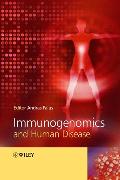Immunogenomics and Human Disease
BücherAngebote / Angebote:
One of the major features that distinguishes vertebrates from invertebrates is the presence of a complex immune system. Over millions of years, many novel immune genes and gene families have emerged and their products form sophisticated pathways conferring protection against most pathogens. The Human Genome Project revealed that the immunoglobulin gene superfamily was one of the largest in the genome, containing more than 2% of all known human genes. High-throughput technologies for the study of DNA, mRNA and proteins, such as microarrays and real-time gene amplification technologies, as well as biobank facilities, are enabling the investigation of these genes and pathways in ever more detail. The parallel development of databases and bioinformatics tools to store and interpret this information will also contribute to greater understanding of the function of the immune system.
Genomics is finally changing from an academic discipline to one with real clinical relevance. The study of immune regulation in response to pathogen invasion, to the presence of malignant or allogeneic tissue and, in some cases, to normal autologous tissue requires techniques that study the behaviour of whole systems in parallel. A genome-wide, systems biology approach is needed to understand the genetic and environmental factors that regulate the healthy immune system and its response to pathogens as well as to malignant cells arising within the body. It will also facilitate determining what goes wrong when the immune system attacks normal host cells, as in autoimmune diseases such as Type 1 diabetes.
Finally, greater knowledge of the immune system will enable us to use it to promote health and cure disease, through vaccine development - targeting both pathogens and tumour cells - and by manipulation of cellular and humoral defences.
This book provides an overview of key conceptual and molecular technologies being deployed in immunogenomics, followed by detailed evaluations of the impact of genomics and systems biology on important areas such as cancer immunology, autoimmunity, allergy and the response to infection. It will be of interest to all those working in immunology, as well as to bioinformaticians and specialists such as oncologists and microbiologists.
Folgt in ca. 15 Arbeitstagen
